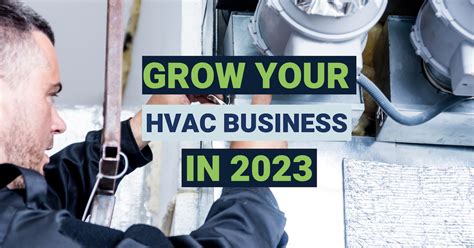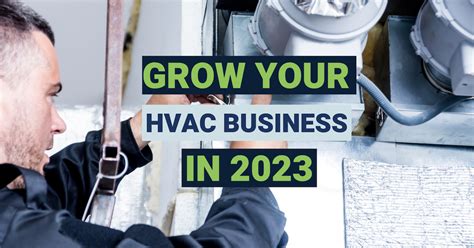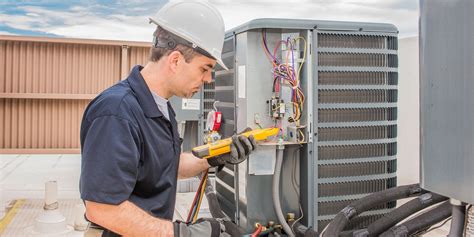How To Grow Your Hvac Business

In the highly competitive world of HVAC (Heating, Ventilation, and Air Conditioning) services, business growth and sustainability are paramount. As an HVAC contractor, understanding the market dynamics, leveraging digital strategies, and offering top-notch services are essential to thrive and expand your business. This comprehensive guide aims to provide you with expert insights and actionable steps to help you grow your HVAC business successfully.
Understanding the HVAC Market Dynamics

The HVAC industry is experiencing significant growth, driven by increasing global energy demands, the push for sustainable solutions, and the growing focus on indoor air quality. According to a recent report by Market Research Future, the global HVAC market is projected to reach USD 228.7 billion by 2027, expanding at a CAGR of 6.3% during the forecast period. This growth presents ample opportunities for HVAC businesses to capitalize on, but it also intensifies competition.
To navigate this competitive landscape successfully, you must understand the unique characteristics of the HVAC market. Here are some key insights:
- Customer Needs: Customers today are more conscious of energy efficiency, indoor air quality, and sustainable solutions. Your business must address these concerns to attract and retain clients.
- Seasonal Fluctuations: HVAC services often experience seasonal peaks and troughs. Effective planning and diversification can help mitigate the impact of these fluctuations.
- Technological Advancements: The industry is witnessing rapid technological advancements, from smart thermostats to energy-efficient systems. Staying updated with these innovations is crucial for your business's growth.
- Competitive Landscape: The market is crowded with established HVAC businesses and new entrants. Understanding your competitors' strategies and unique selling points can help you differentiate your business.
Key Insights from Industry Reports
According to a comprehensive analysis by IBISWorld, the HVAC industry in the United States is highly fragmented, with a low barrier to entry. However, the report also highlights that the industry's profit potential is moderate, indicating a healthy balance between competition and profitability.
Another report by Statista reveals that residential HVAC installations dominate the market, accounting for over 50% of industry revenue. This segment is closely followed by commercial installations, indicating a balanced opportunity for both residential and commercial HVAC businesses.
| Market Segment | Revenue Share |
|---|---|
| Residential Installations | 52% |
| Commercial Installations | 38% |
| Other Services | 10% |

Leveraging Digital Strategies for Growth

In today's digital age, a strong online presence is crucial for any business's success, including HVAC services. Here's how you can leverage digital strategies to grow your HVAC business:
Building a Professional Website
Your website is the digital face of your business. It should be professional, user-friendly, and optimized for search engines. Here are some key considerations:
- Design and User Experience: Ensure your website has a clean, modern design with easy navigation. Make it mobile-friendly, as most customers search for services on their smartphones.
- Content Strategy: Create informative, SEO-optimized content that addresses common HVAC issues and provides solutions. Share industry insights, tips, and success stories to establish your business as a trusted expert.
- Call-to-Action (CTA): Include clear CTAs like "Schedule a Service" or "Request a Quote" to encourage potential customers to take action.
- Contact Information: Display your contact details prominently, including your phone number, email, and physical address.
Search Engine Optimization (SEO)
SEO is crucial for ensuring your website appears on the first page of search engine results for relevant keywords. Here's how to optimize your HVAC business's online presence:
- Keyword Research: Identify the keywords your target audience uses to find HVAC services. Tools like Google Ads Keyword Planner and SEMrush can help with this.
- On-Page Optimization: Optimize your website's content, meta tags, and headings with relevant keywords. Ensure your website loads quickly and is mobile-friendly.
- Local SEO: If you primarily serve a specific geographic area, claim your Google My Business listing and optimize it with accurate information and high-quality images.
- Backlinks: Build backlinks from reputable websites to improve your website's authority and visibility.
Pay-Per-Click (PPC) Advertising
PPC advertising, such as Google Ads, can quickly boost your website's visibility. Here's how to make the most of it:
- Targeted Keywords: Choose specific keywords related to your HVAC services and target a specific geographic area.
- Ad Copy: Create compelling ad copy that highlights your unique selling points and offers a clear call to action.
- Landing Page Optimization: Ensure your landing page is relevant to the ad and optimized for conversions.
- Budget Management: Set a realistic budget and monitor your campaign's performance to ensure a positive ROI.
Social Media Marketing
Social media platforms provide an excellent opportunity to connect with your audience, build brand awareness, and generate leads. Here's how to leverage social media for your HVAC business:
- Platform Selection: Choose the right platforms for your target audience. For HVAC services, Facebook, Instagram, and LinkedIn are popular choices.
- Content Strategy: Share a mix of content, including industry news, DIY tips, and before-and-after project photos. Engage with your audience by responding to comments and messages promptly.
- Video Content: Consider creating short, informative videos showcasing your services or providing tips. Video content performs well on social media and can help build trust with your audience.
- Influencer Marketing: Partner with local influencers or industry experts to promote your HVAC business. This can help expand your reach and build credibility.
Offering Top-Notch HVAC Services
While digital strategies are essential for growth, your core offering—the HVAC services you provide—is the backbone of your business. Here's how to ensure you're delivering top-notch services:
Staying Updated with Industry Trends
The HVAC industry is constantly evolving. Stay ahead of the curve by keeping up with the latest trends, technologies, and regulations. Attend industry conferences, webinars, and training sessions to enhance your knowledge and skills.
Investing in Quality Equipment and Tools
To provide excellent service, you need the right tools and equipment. Invest in high-quality tools, such as diagnostic equipment, specialized tools for various HVAC systems, and safety gear. Ensure your technicians are well-equipped to handle any job efficiently.
Hiring and Training the Right Team
Your team is the face of your business. Hire experienced and skilled technicians who are passionate about HVAC and customer service. Provide regular training and development opportunities to keep your team up-to-date with industry advancements and best practices.
Focus on Customer Satisfaction
Customer satisfaction should be your top priority. Ensure your technicians are friendly, professional, and respectful of your customers' homes or businesses. Offer transparent pricing, provide accurate estimates, and keep your customers informed throughout the service process.
Offering Value-Added Services
Go beyond basic HVAC services to offer a comprehensive solution to your customers. Consider providing maintenance plans, energy efficiency audits, and indoor air quality assessments. These value-added services can set your business apart and increase customer loyalty.
Effective Warranty and After-Sales Support
Provide clear and comprehensive warranties for your services and equipment. Offer prompt and reliable after-sales support to address any issues or concerns your customers may have. This builds trust and ensures long-term customer satisfaction.
Conclusion: Growing Your HVAC Business
Growing your HVAC business requires a strategic approach that combines a deep understanding of the market dynamics, effective digital strategies, and a commitment to delivering top-notch services. By staying informed, leveraging digital tools, and focusing on customer satisfaction, you can position your HVAC business for long-term success and sustainable growth.
Frequently Asked Questions

How can I attract new customers to my HVAC business?
+
Attracting new customers involves a combination of digital marketing strategies and providing excellent service. Optimize your website for local SEO, run targeted PPC campaigns, and engage with potential customers on social media. Additionally, focus on delivering top-notch service to existing customers, as word-of-mouth referrals can be powerful for attracting new clients.
What are some effective ways to retain existing customers?
+
To retain customers, prioritize customer satisfaction and build long-term relationships. Offer loyalty programs, send personalized thank-you notes, and provide regular maintenance reminders. Additionally, consider sending informative emails or newsletters with HVAC tips and updates to keep your brand top of mind.
How can I differentiate my HVAC business from competitors?
+
Differentiation is key in a competitive market. Focus on providing specialized services or targeting a specific niche market. Offer unique value-added services, such as energy audits or indoor air quality assessments. Additionally, invest in your team’s training and development to ensure they deliver exceptional customer service.
What are the best practices for managing my HVAC business’s online reputation?
+
Managing your online reputation is crucial for business growth. Respond promptly to online reviews, both positive and negative. Encourage satisfied customers to leave reviews on platforms like Google and Facebook. Monitor social media and online forums for mentions of your business and address any concerns or feedback.
How can I ensure the financial stability of my HVAC business?
+
Financial stability is essential for long-term success. Develop a comprehensive financial plan that includes budgeting, cash flow management, and forecasting. Consider diversifying your income streams by offering additional services or targeting different market segments. Additionally, explore financing options to support business growth and manage seasonal fluctuations.



